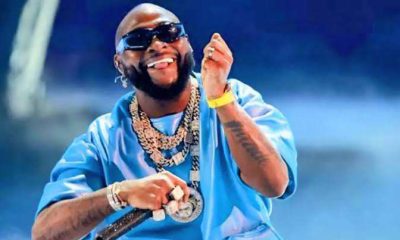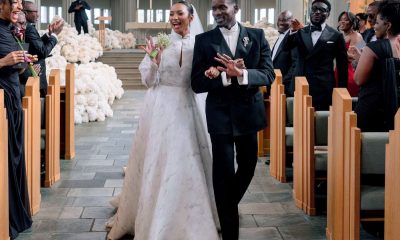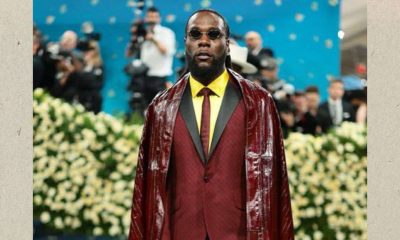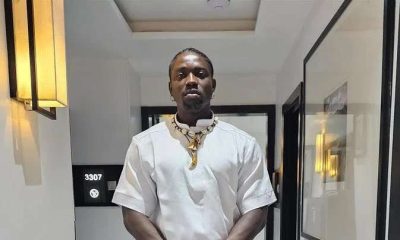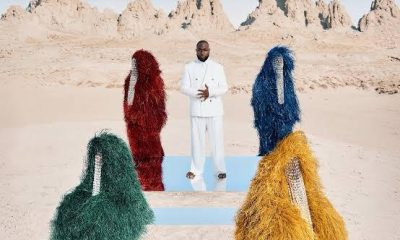Entertainment
Musical wars: Artistes’ rivalries ignite controversy, bolster revenue

Competition and musical rivalries between artistes are often as old as the music industry itself. These rivalries have had a long history in country and have played out over the years, shaping the industry.
Pa Joseph Adetona, 75, is a veteran fan of King Sunny Ade for the past three decades. His house is strewn with Sunny Ade’s albums, ironically his best friend, the late Pa Adéwálé Sanyaolu, was a fan of Commander Ebenezer Obey, Juju maestro widely seen as rival and competitor to Sunny Ade.
Adetona told Business Hallmark that ” I’m a die-hard Sunny Ade fan till tomorrow, I know that Chief Obey is a giant of Juju music, but since one normally has preference I go for Sunny. My best friend until his death, Sanyaolu, preferred Ebenezer Obey to Sunny. Of course, we knew that both of them are music legends.”
The musical trajectory of Adetona as fan and aficionado of good music is commonplace and a good exemplification of how emotional and passionate people can be in appreciating their favourite artistes.
The history of musical competition dates back to the 70s Nigeria – between Sunny Ade and Ebenezer; Ayinla Omowura Haruna Isola; Oriental Brothers Vs Dennis Osadebey; Orlando Owoh Vs Ade Wesco; Ayinla Kolington and Ayinde Barrister.
KSA/Obey
Without iota of doubts, two of the biggest juju musicians in the country’s musical firmament are Sunday Adegeye (King Sunny Ade) and Ebenezer Obey-Fabiyi, and they have been on the scene for decades, and had churned out evergreen upon evergreen over the years. Obey is 82 while KSA is 76 years old.
Obey started out in the late 1950s, and he has since churned out over 50 albums, with many of them containing evergreen songs that still resonate with generations that were not even born when the tracks were made.
KSA formed his own music band in 1967. The King of Juju genre has produced over 123 albums in his musical repertoire.
By virtue of their popularity and wide acceptance, it was not altogether surprising that both were caught in a web of public rivalry for some time.
Over the years, the duo had stated that there was no bad blood between them. But, some diehard fans still choose to believe otherwise.
Obey had stressed that the ‘fight’ between him and KSA was the fancy of their fans. He noted that , “The competition between me and KSA was projected by fans and the media. It almost turned our music into politics.
“Every time, it was ‘Obey this, Sunny that’. We both always ensured that we neutralized all that fake rivalry. That is why I always say that musicians should not see themselves as competitors, but as contributors to the growth of the Nigerian music industry.”
Echoing Obey’s response, KSA once stated that fans were behind the purported rivalries, admitting that at some points, he and Obey also pretended to be fighting. He said, “It was fans that believed we were always fighting. Obey and I had been friends since we began our bands, and we are still friends. He started his band a year before mine. Also, we pretended to be fighting in order for our fans to enjoy our music more. Then, we used to play at night clubs, and where he was playing was not far from where I played. I recall that the fans would go and disrupt his band, and later come to disturb us too. One day, I went to his (Obey) house to meet him behind closed doors. I asked him how we could manage the situation, and he also asked for my suggestion. We both agreed to change the date of our performances at the club. He chose Thursdays while I maintained Wednesdays. Later, we also pretended to our seniors that we had a misunderstanding, so I invited Pa IK Dairo, Haruna Ishola, Adeolu Akinsanya and two others, to help settle the rift. For a long time, to avoid clashes between our fans, if I had a show, I would ask (the organisers) if Ebenezer Obey was going to be there. If they said ‘yes’, I would not honour the invitation; and that was the same thing he (Obey) did too. Our elders then told us there should be no more fights between us, and we should make records to appease our fans.
So, when I sang, he replied too. As the two of us were holding the meeting in his house, we just heard a bang on the door and somebody— the late Olabisi Ajala (a journalist, globe-trotter and writer) — was shouting that, so the two of us were friends, and we were pretending otherwise. We did not open the door, but we had already agreed on how we would be doing things from then on. I have to thank God for his (Obey) life, because he later got a call from God and became a cleric. The bottom line is that we have always been friends. We also advise the young musicians that they don’t need to fight or destroy one another’s shows because of unnecessary rivalry.”
Speaking at another event in Lagos, Obey had urged musicians to eschew bitter rivalries. He said, “Musicians must not see themselves as competitors. I won’t ever stop saying this, because it is a piece of priceless advice.
“Musicians must appreciate one another, because God has given every one of them gifts and talents. These talents can never be the same, no matter how hard they try. Even if we play the same kind of music, it can never be the same.”
KSA/Emperor Pick Peters
A renowned juju maestro , Peter Akorede, aka, Emperor Pick Peters, who died a couple of years ago, had numerous fans in his time as his songs enjoyed widespread patronage by many. Peter was one of the stars of the musical 70s and 80s.
However, one of the most notable highlights of Peters’ career was the perceived rivalry between him and juju maestro, KSA. But, in an interview some years ago, Peters stated emphatically that he never fought with KSA.
According to him, after KSA released an album titled, ‘E K’ilo F’omo Ode’ (Warn the son of the Hunter), many of his fans told him that the song was directed at him. Prior to that time, Peters had come into the industry, proclaiming that he was the son of a hunter (omo ode); so it was not surprising that many fans believed that KSA’s song was targeted at him.
Narrating what had transpired between him and KSA up to that point, Picks stated in an interview that he had informed the latter of his intention to join a company owned by the late Bolarinwa Abioro, who was KSA’s uncle. He added that KSA promised to assist him, and he (Peters) told the former to advise Abioro to buy him a Volkswagen bus (danfo), to convey his musical equipment; not knowing that there was a crisis between KSA and Abioro.
In his words, “I decided to go to the studio after an album released by King Sunny Ade titled ‘E k’ilo f’omo Ode. Let me tell you the truth about that song; KSA is not the original owner. It was Ambrose Campbell (a highlife and juju musician) song.
“However, all the stories that I was fighting him (KSA) did not hold water. KSA is my brother and friend. We were together when he was living in a rented apartment. I used to go to his house; and his late wife, Yetunde, used to cook for us.”
Asked to define his current relationship with KSA, he said simply, “It is as cordial as ever. If I want to see him now, I will see him. We are very cordial friends.”
It is pertinent to note that at all the records they made during that time were massively bought by fans.
Dele Abiodun angle
Amidst the raging brouhaha, Peters was also locked in a ‘battle’ with his former band mate, Dele Abiodun.
Recalling the genesis of their crisis, he said, “It started in 1975, when I was to play with Dele Abiodun at a funeral at the Ita Faaji area of Lagos Island. Abiodun was there before me, because I had an earlier show in Ogun State. On getting there, we exchanged greetings. We drank and ate together, and agreed to play for one hour each. But, my friend mounted the stage and started abusing me. It was at that event he debuted his popular track, ‘O jebi o jebi Omo Ode’ (The Son of the Hunter is Guilty).”
Offering a glimpse into how fans, sometimes, fanned the embers of such discords, Peters continued, “When my fans heard this, they came to me and insisted that I must fire back, or they would back out as my fans and become Dele’s fans. I was confused because I was not prepared for all that.”
Peters later released a song titled, ‘Ejuba f’omo Ode’ (Pay Homage to the Hunter), which was believed to be his response to Abiodun.
Barrister and Kollington
The infighting between two fuji heavyweights, Ayinla Kollington; and his late former contemporary, Sikiru Balogun, aka Barrister, is one of the defining landmarks of the fuji music history in Nigeria, as it also dominated news headlines for a long time. Though they used to be friends, their relationship later degenerated badly.
In a book, ‘Ayinla Omowura: Life and Times of an Apala Legend’, authored by media personality and lawyer, Festus Adedayo, Kollington claimed that the fight between him and Barrister began after he (Kollington) released an album that was a response to apala musician, Fatai Olowonyo, an arch-rival of another apala musician, Ayinla Omowura, who Kollington was taking tutelage under at the time.
Kollington added that Olowonyo then approached Barrister to record a reply to him (Kollington) and Omowura.
The book quotes him as saying, “Olowonyo enlisted Sikiru (Barrister’s) help in attacking and replying to my diatribes on the song, ‘Omo Iya onipako’. Sikuru too behaved like a child; in that he ought to have thought about the fact that I was his friend. Instead of acceding to Olowonyo’s request, he should have called me to seek an end to the feud. Rather than do that, he also went to the studio to sing against me. That was how the fight began.”
However, in an interview with City People Magazine in 2020, Kollington stated that their fight ended when his mother died. He said, “It was God that ended the fight for us when Iya Ilu Oke (my mum) died. But, as we kept ending the fight, people kept bringing it back.”
Obesere/Kwam1/ Said Osupa
The rivalries in the industry extended to the young Turks in Fuji genre such as Abass Akande, aka Obesere; and K1 de Ultimate, as the duo do not see eye to eye. Though it is not exactly clear what started their feud, many have tried to intervene without success.
In an interview with Daily Post some years ago, Obesere noted that he took exception to the fact that after Barrister’s death, K1 allegedly started parading himself as the leader of fuji musicians in the country. He said, “After Barrister’s death, K1 started parading himself as the new king of fuji. But, he cannot be the new king when Kollington is still alive. That is rude. Kollington had been playing music long before all of us, and that makes him our father. Even if Kollington were no more, K1 would still not have the right to call himself the leader of fuji musicians.
“He has never been a king over me. He is the lord of his own music. He is rude to even the elderly ones, and that is why someone like me will never agree with him on anything.”
Lately two there is a rumours of strained relationship between Kwam1 and Said Osupa.
Pasuma/Saheed Osupa
The two heavyweights of Fuji are also believed to have rivalries history punctured by strained relationship.
Though there have been different accounts given for the cause of their rivalries, according to some stakeholders in the industry, the rift started when the late Barrister crowned Osupa as the ‘King of Fuji Music’ and ‘Ayangalu 1st (a traditional title given to drummers and musicians in Ibadan, Oyo State).
Wizkid/Davido/Burna Boy
Ayodeji Balogun, aka Wizkid; and David Adeleke, aka Davido, are two young Turks that have dominated the industry for some years, they are about the same age. Their music has traversed borders, and both artistes have hosted sold-out shows in different parts of the world, including London (United Kingdom) and New York (United States of America).
But unfortunately, they are rivals with aggressive fans who easily fan the embers of feud between the two leading artistes.
Wizkid’s following is known as Wizkid FC, while Davido’s diehard fans are called ‘30 Billion Gang’. Both fan bases are usually ferocious in defending their idol and casting aspersion on the other. The fans constantly compare the artistes in practically everything they do. For example, whenever Davido buys a new vehicle, his fans are quick to rub it on the faces of Wizkid’s fans that the former is doing better than their star.
In different interviews, both artistes have denied being at loggerheads, but their actions or inactions are often interpreted to suit certain narratives by their fans. Other young artistes that have been involved in bitter rivalries include Bnxn (formerly Buju) and Ruger; Vector and MI Abaga;
Abraham Odutola, record executive told Business Hallmark that “the so-called rivalries are a selling point for these artistes, but the media ignorantly buy into it everytime such issue arises. Though , some times, these rivalries are real because life is a competition.
This view was echoed by Olarinde Babalola, an aspiring reggae artiste, who told Business Hallmark that “Artistes are happy when the story goes out that they are feuding over superiority. This has the potential to increase sales of their records with associated benefits coming in.


